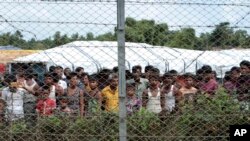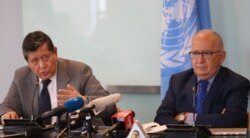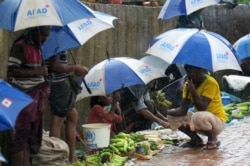A U.N. fact-finding mission is calling for an international investigation into the dangers faced by 600,000 Rohingya, who the UN says are living under the threat of genocide in Myanmar’s Rakhine State. The findings, which have been submitted to the UN Human Rights Council in Geneva.
The three-member Independent International Fact-Finding Mission on Myanmar reports the government-ordained human rights catastrophe in the country continues.
Chair of the Mission, Marzuki Darusman, recounts last year’s report, which found credible evidence of crimes against humanity and war crimes committed by Myanmar’s armed forces, known as the Tatmadaw, against ethnic communities. He says these same crimes continue.
“We found genocidal acts and the inference of genocidal intent, in the Tatmadaw’s 2017 'clearance operations' against the Rohingya population. For decades, Myanmar’s security forces have enjoyed impunity for their brutal crimes,” he said.
He says the Mission’s report is based on evidence gathered from nearly 1300 interviews with victims and eyewitnesses, and tens of thousands of documented human rights abuses in ethnic communities.
From this mountain of material, he says it is clear the dangers that forced more than 740,000 Rohingya refugees to flee to Cox’s Bazaar, Bangladesh last year continue to this day.
Darusman says the situation of some 600,000 Rohingya remaining in Rakhine State is largely unchanged. He notes the discriminatory laws, including the 1982 Citizenship law that strips the Rohingya of all basic rights remain in effect and continue to be used as a tool of persecution.
“We conclude that there is a strong inference of continued genocidal intent on the part of the State in relation to the Rohingya, that there is a serious risk of genocide recurring and that Myanmar is failing in its obligations under the Genocide Convention to prevent genocide, to investigate genocide and to enact effective legislation criminalizing and punishing genocide,” said Darusman.
Myanmar’s Representative to the U.N. in Geneva Kyaw Moe Tun questions the motive, impartiality and credibility of the report. He says it paints a distorted picture of the reality of the humanitarian situation in his country and is based on unsubstantiated allegations and misinformation.
He says impunity is not accepted by policy or by practice by his government and where there is credible evidence, action is taken against perpetrators of crime.
He rejects moves to bring the issue before an international judicial or legal body. He also denounces the Mission’s call for sanctions against Myanmar. He says efforts to isolate Myanmar economically would inflict hardships on millions of innocent people and impact negatively on their enjoyment of human rights.










